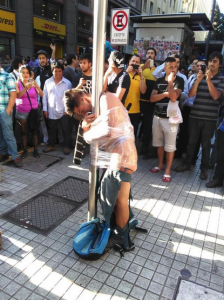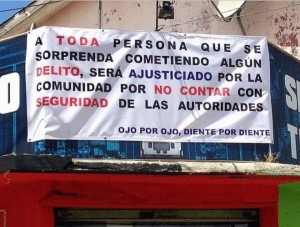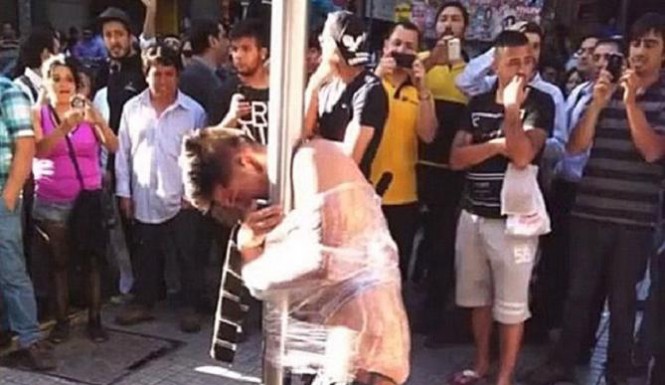Tweet
Chile has been experiencing a nationwide surge in what has commonly become referred to as “detención ciudadana” or “civilian detention,” otherwise characterized as vigilante justice.
The phenomenon has been captured on personal and security cameras throughout the country and uploaded to YouTube and other social media in growing numbers. These events span the gamut between pickpockets being caught in the act to groups of citizens disarming assailants and subduing them until authorities arrive. The result is often violent and disturbing for those involved and onlookers alike.
In the most recent and possibly the most highly publicized case, a young, knife-wielding man attempted to rob an elderly woman but was quickly  beaten, stripped of his clothing, and cling-wrapped to a metal pole. On Nov. 28 Valentino Abeyta Barrera, 32, found himself on the receiving end of a public flogging and shaming that recalled the stocks and pillory of old. After 20 minutes of sweaty humiliation inside his plastic cocoon, Barrera was released by police officers and walked away without charges being filed because the alleged victim had not made a complaint.
beaten, stripped of his clothing, and cling-wrapped to a metal pole. On Nov. 28 Valentino Abeyta Barrera, 32, found himself on the receiving end of a public flogging and shaming that recalled the stocks and pillory of old. After 20 minutes of sweaty humiliation inside his plastic cocoon, Barrera was released by police officers and walked away without charges being filed because the alleged victim had not made a complaint.
In what may be a symptom of the increasing numbers of civilian detentions, a police spokesperson recently stated, “Unless the man who was tied to the lamppost or his alleged victim want to file a complaint, there’s not much we can do.”

“It’s a combination of the lack of faith in the criminal justice system in Chile and the fear of reprisals that keep many crimes from going unpunished,” said Victor Garrido Inzulza, a 31 year-old from San Pedro de la Paz. “The judicial system meters out what amounts to a slap on the wrist and victims are genuinely scared that these criminals will circle back when they find out the name of the person who files the complaint. The criminals fear nothing in Chile and are usually back on the streets the same day even if a victim is brave enough to file a complaint.”
Until recently, that is. With the rise in civilian detentions, would-be robbers and thieves have far less certainty guiding the fate of their actions. These “detentions” are often marked with brutal violence coupled with public humiliation, flipping roles between victims and victimizers. Many alleged criminals find themselves stripped of their clothing, hog-tied, beaten, slapped, spanked, and verbally abused by a group of people recording video and taking pictures of the entire incident. The nature of the internet makes this public embarrassment rife with lifelong consequences.

The group dimension adds another element to these events. Once captured, escaping crowd sourced justice is like an insect trying to free itself from the web of a spider. Almost without exception, the alleged criminal is pinned to the ground by a group of civilians until police arrive, and then they are handed over to the authorities. This new form of vigilante justice in Chile seems to have circumvented two perceived impediments to curbing Chilean street crime: lack of punishment and fear of reprisals. After receiving a thrashing, usually accompanied by some form of public embarrassment immortalized by uploaded images, the alleged criminal is hard-pressed to exact revenge against an anonymous crowd of participants and onlookers.
Many argue this phenomenon is a type of crime deterrent. However, any hope of remaining innocent until proven guilty is significantly reduced by the long memory of the internet and emotional response of the mob mentality–a problem easily over-looked in country where street criminals have, until recently, felt safe and emboldened.
“I feel safer in public now,” said Inzulza, referring to growing numbers of civilian detentions, “because I know people are going to help me if something happens to me. At the same time, I don’t think Chile is safer, in general, because the same criminals are still free and will look for more private settings for their illegal activities.”
[su_youtube url=”https://www.youtube.com/watch?v=oQ8VDnD6ZXo”][su_youtube url=”https://www.youtube.com/watch?v=2KTpIHL6FgE”]VIDEO[/su_youtube]
See more: Selected Detención Ciudadana YouTube videos
Analysis by Jay Verkamp
